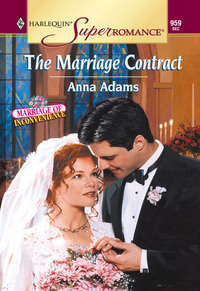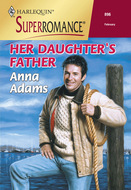Buch lesen: "The Marriage Contract"
“Have you heard the terms of my father’s will?”
Clair shook her head. Nick’s words, “give your house back,” echoed in her head, the rasp of his tone burrowing deeper into her mind.
“Jeff left everything to me,” he said absently, as if he’d forgotten she was listening. “But there were stipulations. He said I have to marry. Fall in love and marry within twelve months.”
Only Jeff Dylan would be arrogant enough to believe he could regulate love. “What do you want?” she asked.
“I want you to marry me. If you pretend to be my loving wife for twelve months, I’ll sign your house over to you.”
“You must know other women. What’s wrong with them?”
He laughed without joy or happiness. “I know other women, but I don’t want to marry any of them. I don’t want to start a marriage with someone who’d expect it to last. Can you imagine you’ll want to stay married to me?”
Her stomach knotted. “No.”
“Then you’re the wife I want.”
Dear Reader,
I grew up in a loud, loving, extended family. My aunts and uncles continue to love me as if I’m theirs, and I can’t really tell my cousins from my own siblings. I know how lucky I am.
How many of you live away from your family, as I do now? Clair, my heroine in this book, shares my longing for hearth and home, for seeing the faces of people who belong to her as she belongs to them. I hope you’ll enjoy reading about Clair and her not-so-convenient husband, Nick Dylan. Out of a marriage contract, they build a life and home and best of all, an extended community family of their own.
If you’d like to share your thoughts on this story, please feel free to write to me at P.O. Box 801068, Acworth, GA 30101 or annaadams@superauthors.com
Sincerely,
Anna Adams
The Marriage Contract
Anna Adams
To Sylvia, in memory of Becky.
I hope that soon the joy of her life
eases the pain of your loss.
CONTENTS
CHAPTER ONE
CHAPTER TWO
CHAPTER THREE
CHAPTER FOUR
CHAPTER FIVE
CHAPTER SIX
CHAPTER SEVEN
CHAPTER EIGHT
CHAPTER NINE
CHAPTER TEN
CHAPTER ELEVEN
CHAPTER TWELVE
CHAPTER THIRTEEN
EPILOGUE
CHAPTER ONE
NICK DYLAN lifted his glass to the orange sun that glinted through his father’s library window. No. His window. He’d buried his father that morning. Uneven panes of glass twisted the October light, destroyed his perspective of the coming sunset, much as his father’s life had twisted Nick’s outlook on his own existence.
But not on his future. Senator Jeffrey Dylan had no right to Nick’s future.
The library door opened behind him, and a man’s footsteps preceded a gruff voice. “Dr. Dylan, why didn’t you accompany your mother to Mr. Thomas’s office?”
Nick’s temples throbbed. “Leota went without me?” He turned away from the window. His mother’s decision to go alone didn’t surprise him.
He looked at Hunter, who’d run the family home here in Fairlove, Virginia, since before Nick was born. Stubble etched the older man’s face. Though he wore his usual, perfectly pressed navy suit, Hunter’s inattention to his beard was as good a sign as any of the grief that darkened this house.
Grief Nick couldn’t feel. He mourned his father’s lifelong disappointment in him, mourned the relationship he’d never won. Maybe he’d been wrong not to compromise more, not to find a way to be the son his father had tried to make him.
“I saw the limo turn out of the driveway. I thought you were with her, sir,” Hunter said.
“Maybe she didn’t want to wait for me. You know she likes to be early for her appointments.” Nick tried to cover up the unease between himself and Leota. Her anger, a freewheeling, almost tangible entity, had grown with every passing second in the three days since his father’s death. When Hunter had called to tell him about the brandy and sleeping pills he’d found on Leota’s nightstand, Nick had moved back into this house. Though Nick and his mother were not close, he loved her. He wanted to care for her.
“I assumed she’d want your support, sir.” Hunter straightened. “Perhaps she needed a moment to herself.”
Crossing the Oriental rug, which muffled his footsteps on the wide plank floor, Nick tossed back the Scotch he’d poured himself. He set the tumbler on the tray that always stood beside his father’s favorite leather armchair, grimacing as the alcohol scalded his throat. “Maybe I can catch up with her.”
“Sir—”
“I wish you’d stop calling me that. Nothing’s changed between us since Jeff died.”
“I feel awkward calling you Mr. Nick.”
At thirty-two, Nick had almost forgotten the title Hunter had used when he was a child. “Try just ‘Nick.’ You’ve managed not to call me anything for the year I’ve been back in town.”
Hunter’s self-conscious smile looked sad. “I’ll try.”
Nick fought an overwhelming urge to hug the other man. He’d last hugged Hunter on the morning his father had sent him away to boarding school. Hunter, the only man who’d shown him affection. Far more of a father to him than Jeff had ever been.
“If, for some reason, Leota didn’t go to Wilford’s office and she calls here, will you let me know?”
“She’ll be there.” Hunter sounded certain. “Despite her grief, she must be curious about your father’s last wishes.”
Or else she dreaded finding out what Jeff might have planned for them—the housemaid he’d married because she was pregnant and the son who’d almost been born a bastard. Nick grunted agreement. He glanced back at the older man as he curved his hand around the ornate library door frame.
“Get some rest,” he said, uncomfortable with Hunter’s sorrow. How deeply had he cared for his difficult employer? Nick had never discussed Hunter’s feelings for Jeff, because he couldn’t define his own.
The older man had been a refuge of stability for Nick. His presence had buffered Nick from Jeff, who’d found Hunter difficult to criticize.
Nick paused in the wide parquet-floored hall. He owed Hunter more than a caution to rest. He should ask straight out how the other man felt. A normal caring human being would ask the question. And once he crossed the final emotional minefield of his father’s will, he believed he could begin to live like a normal human being. If he survived without a mortal blow, he’d come back here and ask Hunter to join him in a beer.
Nick hurried through the double front doors and then strode down the brick steps to his battered Jeep. The old green car was parked on one side of the curving drive like a poor relative, hoping for a kind welcome. Last night, after the limo driver had brought them back from the family visitation at the funeral home, Leota had suggested Nick hide his eyesore of a vehicle in the garage, or better yet, in one of the empty barns on the property.
Putting the Jeep in the garage would have made it appear he’d come home to stay. And though he’d never admitted it to another living soul, home wasn’t a place where he felt comfortable.
He pushed his key into the ignition. As the engine coughed to life, he watched the lights starting to come on in the town below. From up here on Dylan property, Fairlove looked quaint and warm.
Appearances were deceiving. Since he’d come back to Fairlove, Nick had lived in a small house just two doors from Saint Theresa’s—the church parking lot was where Hunter had taught him to ride his bike. For the past twelve months, Nick had attended countless school-board meetings and potluck suppers. He’d “doctored” townspeople who came to him only as their last resort, and he’d tried to turn himself into one of Fairlove’s ordinary citizens. But the townspeople couldn’t seem to forget he was a Dylan and therefore the last physician they wanted to treat their sore throats, arthritis or lumbago.
As the pole light above the Jeep came on, Nick put the car in gear and started down the winding road into the town spread out below him. Movement on the street in front of the high school drew Nick’s gaze to the kids escaping at top speed from band practice.
Car lights flickered on as the parents who’d waited for their children started their engines and began to head for the tidy rows of federal-style houses. Some of the buildings had been built before the American Revolution, but some were new construction, erected according to the town’s covenants. Nick had bought one of the newer houses. He’d lived in a historical monument long enough.
At the bottom of the hill, he checked for traffic on his left, then his right. The sight of the Atherton house provoked the usual momentary pang of helpless guilt. Derelict, forgotten, except by his father, the house called The Oaks was slowly falling down.
Nick looked away from his father’s trophy. Jeff had destroyed the Atherton family while Nick had been away at college. If he’d been home, would he have tried to end the vendetta before the family disappeared from Fairlove? Or would he have sided with his mother’s wounded pride and stood aside while his father took vengeance on the man who’d married Sylvie Atherton, the woman Jeff had truly loved?
Nick pressed his gas pedal and tried to put the past he couldn’t change behind him. He had to concentrate on the here and now, on Leota, who seemed to be self-destructing, and on the will, which might contain a last, posthumous blow.
He passed his own dark house and the church before he turned in front of the courthouse. His father’s black limo took up two of the hotly contested parking spaces on the square in front of Wilford Thomas’s office. All around the limo, reporters and cameramen waited, their equipment at the ready.
Nick found a space as far away from them as possible and dodged through the evening traffic on foot. Wilford had arranged this after-hours reading to avoid the reporters who’d been following Leota. Obviously his ploy had failed.
“Dr. Dylan! Nick!” As he reached the door to Wilford’s office, a man behind him shouted his name. He ignored the voice and yanked the door shut behind him.
Wilford immediately came out of his inner office. In his mid-fifties, he had white, perfectly coiffed hair and wore a suit as appropriately conservative as Hunter’s. “I thought I heard a commotion. Come on in. I’ll lock this door until we finish. I had the sheriff come by and give the press a talk about trespassing.”
Leota looked up from the far side of Wilford’s desk, slender, blond, perfectly made up and emotionally frozen.
“I thought we planned to drive together,” Nick said to her.
“Why don’t you all stop treating me as if I’m a lunatic on the verge of a breakdown?”
Nick, taken aback at her response, moved to the chair beside hers. He leaned toward her and lowered his voice. “I only meant you don’t have to do this alone. You and I are still family.”
Leota flashed him a look that fairly sizzled with rage. Nick made a conscious effort not to show his bewilderment. Jeff’s death seemed to have released all the demons she’d formerly held at bay.
“Can I get either of you a coffee?”
Nick turned to Wilford. The attorney’s nervous tone boded bad news. “I’m fine.” He glanced at his mother. “Leota?”
“No. Let’s get on with it.”
“Do you want word for word, or the gist first?” Wilford asked.
Nick tried to corner the attorney’s shifting gaze. “Why don’t you tell us what’s making you uneasy?”
Wilford Thomas subsided into his chair, fumbling with the knot on his silver-blue tie. “I’m sorry, Nick.” His glance flickered to Leota. “Don’t look like that. Jeff hasn’t left the house to a stranger or anything, but he’s made an unusual stipulation.”
“We’re waiting.” Leota’s voice cut like a knife.
“You have the use of the house for the rest of your life, Leota, and you also receive a generous income. I’ll go over the details in a moment, but first, I want to go over the bequest that concerns Nick.”
“Jeff always wanted me to specialize rather than becoming a GP.” Nick attempted a casual laugh. “Are you about to tell me I have to go back to school?”
“Worse, I’m afraid. All assets not mentioned elsewhere, the bulk of the estate, really, go to you, Nick, but—and this is the part that troubles me—he’s stated a condition.”
“Go on.” Nick’s pulse nearly choked him. He let go of all hope that Jeff had finally forgiven him for the fact of his birth.
“He wants you to get married. Actually, the language states you must ‘fall in love and marry within the next twelve months.’ The marriage must exist for at least a year, and the other executors, along with your mother and I are required to ascertain your marriage is valid. Also, you must remain in the family home for the first year of marriage.”
Nick lifted his hands as if he could stop the world from falling in on his head. “Don’t finish.” Standing, he dragged a hand through his hair. “Only my father would believe he could force me to fall in love with someone.”
“And marry her,” added Wilford, a stickler for details.
“And stay married for at least a year.” Leota’s voice was leavened with bitterness. “That’s true love for you. Jeff’s idea of it, anyway. Wilford, can we seal this will? Can we keep the papers from publishing it?”
Dumbfounded she could so easily accept his father’s plans, Nick understood that her first priority was still protecting the family name. She’d sold vital parts of herself to hold that name.
He turned to Wilford. “Can his terms be enforced?”
“You’d have to go to court to fight them. And, Nick, your cousin Hale inherits if you don’t meet the conditions.”
Leota sprang to her feet. “I won’t let you contest your father’s will. You can’t broadcast our private family matters to…to—” she pointed through the windows “—to them!”
Her hysterical tone betrayed her pain, but he wouldn’t go along with a farce of a marriage like the one his birth had caused. “Jeff still wants revenge because you got pregnant with me. I won’t let him have it, and I don’t care who finds out.”
“I know you, Nick. You do care—about people you’ve never even met. People who believed in your father. Look at those happy family pictures your father’s office distributed to any newspaper or magazine who’d run them. You could have stopped posing for them.”
“That was politics. I’m his son. You know this doesn’t compare.”
“What about me? I care what happens to his name. I don’t want anyone to know Jeff the way we did. And what about the house? Do you want to lose everything?”
He didn’t put a comforting arm around her shoulders. They never touched each other that way. “You and I will be all right.” But could he just let Hale take over?
Leota grabbed his arm, her gaze haunted. “Promise you won’t contest your father’s will. I couldn’t stand facing any more reporters. And Hale—he’ll turn our home into an amusement park.”
Wilford’s chair squeaked as he leaned forward. “Let’s get back to Jeff. I don’t understand what you’re trying to hide about him.”
Leota tightened her hand on Nick’s arm as she met the attorney’s gaze, a sheen of moisture lighting her eyes. “Jeff and Nick and I were a family. Our lives are no one else’s business.”
“You can’t expect Nick to marry someone in the next twelve months just so he can keep the property and money?”
“I can.”
She dropped smoothly into her pattern of subservience to Jeff’s wishes, as if she were a drowning woman who’d grabbed a rope. She didn’t know any other way, and Nick feared what it would do to her if he forced the issue.
“I don’t expect my son to marry just anybody,” she said. “We know plenty of suitable women. He’ll fall in love with a woman of good breeding and quality who would have made his father as proud as she’ll make me.”
Nick’s concern for his mother overwhelmed his urge to break free of Jeff, but he had to point out the obvious. “You want me to just pick a woman and fall in love with her?”
“I want you to do what your father asked.” Leota lowered her voice to a hiss. “For once, carry out one of his dreams for you.”
Dreams, hell. He refused to allow Jeff to turn his life into a nightmare. His father’s idea of a suitable woman piled insult on injury. “I never made a choice he liked. Now would be the worst time to start.”
Wilford stacked the pages of Jeff’s will. “One thing I think Leota’s right about, Nick. Are you sure you’d want to go over this in front of a courtroom? Whatever drove your father to make these demands would come out. Do you need to ruin his reputation? He was, after all, a United States senator.”
“And how about my reputation?” Leota said.
Her broken tone reached him. Hadn’t she suffered enough at his father’s hands? “Why do you still care?” he asked, more honest with her than he’d ever been.
“He was my husband.”
She lifted her chin, perfectly formed through expensive surgery she’d undergone because she’d never looked good enough for Jeff. In his eyes or, consequently, her own. Nick’s knowledge of her pain weighed much more than his concern for name or money.
“I can’t decide this now.” But he was pretty sure he’d already decided. To help Leota he would force himself to give in to Jeff. “I’ll call you, Wilford, to schedule a time so we can go over the rest of the will.”
He didn’t look at Leota again as he unlocked the office door and stepped into the anteroom. As soon as he closed the door behind himself, another woman rose from a straight-backed chair.
“Nick?”
“Mrs. Franklin.” Selina Franklin and her husband, Julian, known around Fairlove as “the judge” ran Franklin House, an upscale bed-and-breakfast. “Can I help you? Are you sick?”
She shook her steel-gray head. “I have a question to ask you.” She opened her purse and plucked out a yellowed piece of paper. “Read this first. I received it almost twelve years ago.”
What now? Barely holding on to his patience, Nick took the paper. The writer had typed the words and hadn’t signed the note.
“If you value your husband’s career,” it read, “you’ll stay out of my plans for the girl. And if you tell anyone about this, it’s your word against mine. I’ll enjoy ruining the judge while we find out I’m more credible.”
Nick didn’t need a signature. He knew the tone intimately. “What girl?” he asked.
“Clair Atherton. After her mother, Sylvie, died, I tried to get her out of foster care and adopt her. Someone kept blocking me, no matter what I or my husband tried. When I realized who was behind our problems, I spoke to a few other people in town. After I visited with Mayor Brent, I received this note. I knew the mayor and every other man your father owned would line up to say I’d typed it myself.”
She was right. Mayor Brent and Jeff had fished, hunted and apparently practiced extortion together. Jeff’s eulogy at Brent’s funeral had won him his fourth term in the Senate.
“Where is Clair Atherton?” Anger produced a note in his voice he didn’t even recognize. He didn’t want to believe Jeff could hurt a child.
Selina didn’t answer. He’d known her most of his life, but since he’d come home, she’d treated him with icy deference. Now he understood why.
“Are you like your father?” she finally asked.
“What are you talking about?” He wanted to tear someone apart, not stand around discussing whether he would persecute little girls. Clair Atherton must be in her twenties now. Surely old enough to take care of herself.
“I’m going to invite Clair back to Fairlove. If she comes and you try to harm her, you’ll face all of us who had to let her go. We were afraid we couldn’t protect her any better than we protected her parents, but you don’t have your father’s political clout.”
Deep in Selina Franklin’s eyes burned guilt as strong and relentless as Nick’s own. He felt her start of surprise as she also recognized his secret shame. Turning away from her, he started toward the door on legs that felt as stiff as iron pokers.
He glanced over his shoulder, but didn’t allow himself to meet Selina’s gaze. “Clair Atherton has nothing to fear from me,” he said.
TWO DAYS BEFORE HALLOWEEN, Clair turned off the interstate at the Fairlove exit. Immediately, the trees seemed more lush. She rolled down her window to breathe in the crisp air of home. A small green sign directed her toward town. Within seconds, she came upon Shilling’s Gas ’n’ Go.
It looked pretty much as it had the day she’d left. The same sign displayed gas prices in bold black letters. Twelve years ago, she’d stared at that sign through the back window of a social worker’s van.
She didn’t need a map to find her way from here. She could have driven to Franklin House with her eyes closed. This hour of the day, breakfast cooking in Selina Franklin’s kitchen lured anyone with a sense of smell.
Clair suffered from even stronger appetites. Mrs. Franklin’s invitation had answered a longing Clair had never satisfied. Her mother’s old friend had said she’d found her through the “white pages” on the Internet, and she’d wondered if Clair ever thought of the old town.
Clair hardly ever forgot. The house she’d lived in might have fallen into ruin after all these years of neglect. Often, she’d dreamed of Jeff Dylan demolishing it with a big yellow crane and a wrecking ball. But she couldn’t forget the place where she’d known love, unconditional and ever-present, love whose memory made her hungry for the place she’d felt it.
But she was no longer a naive child, and she had to wonder why Selina Franklin had suddenly remembered her. Her parents’ dearest friends, Mrs. Franklin and her husband, an ambitious attorney whom Clair’s father had nicknamed the Judge, hadn’t been the only ones to look the other way when Social Services had cast around for someone who might take Clair in. None of the people she’d thought were like family had found room for her.
Which made Mrs. Franklin’s invitation all the more suspect. She’d asked for whatever time Clair could spare. Clair reminded herself to be wary. People rarely made such generous offers without an ulterior motive.
She slowed her car at the small elementary school, and memories assaulted her, of books and paper, overheated children who played hard outside at recess. Her memories had never left her, had, in fact, grown more important to her, because they formed a lifeline back to Fairlove.
The bell at Saint Theresa’s began to peal, a call to morning prayers, and Clair turned her car toward the sound. Those deep chimes had punctuated so many moments of her first fourteen years. She was glad she’d broken her trip from Boston in D.C. the night before. She’d wanted to arrive with the morning bells.
As soon as she rounded the corner into Church Street, she saw him. Nick Dylan. The man whose father had destroyed her family. Tall, lean and prosperous-looking in a dark suit and a long black overcoat, he was carrying what appeared to be shirts from the dry cleaners.
Clair began to shake as she saw him approach a Jeep and open the door. The long dry-cleaning bags twined around his body. She slowed as he tucked his laundry in his back seat.
Good. With any luck, he was on his way somewhere else. Since the cleaners was closed on Sunday, he must have brought the shirts from his house. Maybe Fairlove wouldn’t keep him now that his father had died.
He straightened, and the wind lifted his jet-black hair. She glimpsed his sharply etched, aristocratic Dylan face, dark eyes that met hers and instantly flared. Clair looked away, but she couldn’t help looking back at him. His pale, shocked expression struck her as she passed him.
Barely three feet separated them, a space poisoned by years of family enmity. Clair clamped her teeth together, to keep from shouting her frustration. How could she have prepared herself for a Dylan mundanely packing his shirts in a car?
Rattled, her heart pounding, she drove twice around the square. People stared, but no one else recognized her. To push Nick Dylan out of her mind before she saw Mrs. Franklin, she concentrated on the buildings.
A landscaper had taken over the old ice-cream shop. The local newspaper had bought out Mrs. Clark’s sewing-and-crafts shop and added on to their property.
Clair fought back unwanted tears. The sheer, comforting familiarity of these streets and buildings brought her past back to her. Her memories hadn’t just been myths she’d created to help her survive in foster care.
She turned down the town’s outer road toward the high school where she’d been in her first year when her parents had died. Those rooms hadn’t left a strong impression. Nor had the apartment block behind the school, where they’d lived until her father died, a victim of his own sense of failure after he’d lost their house to Senator Dylan. After her father’s death, her mother lost interest in everything. Including her own life. Within months she’d suffered a heart attack and followed her husband to the grave.
Clair looked up the hill. If her home still existed, thick evergreens hid it from her, but the Dylan home remained as commanding as ever. An image of Nick flashed through her mind, but his stunned expression got all mixed up with his father’s customary contempt.
She turned away from that house, determined to conquer the pain that still tore at her. She shouldn’t have come this way. She drove straight to Mrs. Franklin’s bed-and-breakfast, determined to live in peace with her memories of the Dylans.
Her other choice was revenge. A pointless exercise that couldn’t bring back the parents and the home she’d lost.
Clair parked at the bottom of the steps in front of the bed-and-breakfast and climbed out of the car. She swung her backpack over one shoulder. Caution moistened her hands and dried her mouth.
She marched up the stairs and then curled her fingers around the cool brass door handle. Counting two quick breaths, she pushed the door open and stepped into a shadowy hall. Overhead, a fan’s blades whiffed in rhythmic puffs of sound. She waited for her eyes to grow accustomed to the subdued light.
“Clair, you’ve come home.”
Her heart hammered. Home. She knew this woman’s voice—rich, ragged around the edges. Selina Franklin had been a frequent visitor at Clair’s house. She’d brought homemade oatmeal cookies and sock puppets with black button eyes.
The shadow in front of Clair slowly formed itself into a woman who seemed too short to be Mrs. Franklin. Clair had last seen her through the back of that Social Services van. Her memory of her mother’s friend was all bound up with a painful mantra the woman who’d driven her to D.C. kept repeating. “You can’t stay. You have no one here to take care of you.”
That memory had become a nightmare. Mrs. Franklin must have known how she’d felt. Old resentment she no longer wanted to feel rose in her and she swallowed convulsively.
The other woman lifted pale hands to her own throat. “Can you be Clair?” A slight change in the arrangement of lines around her mouth conveyed her welcome. “You look so much like your mother that for a moment I thought you were her. Sylvie was your age when I first met her, when she came here to teach. What are you now? Twenty-four?”
“Twenty-six.” Clair drank in the other woman’s delicate features, pale blue eyes she remembered laughing at her mother’s jokes, a generous mouth that had grown thin after her parents’ deaths. “How is the judge?”
“He lived up to your dad’s expectations. The governor appointed him to the bench about ten years ago.” Mrs. Franklin turned to pluck an object from a cubby behind her desk. “I’m so glad you’ve come. I’ve given you a room, because I thought you’d be more comfortable on your own than staying in my guest room.” She slid a big old-fashioned key across the desktop. “I’m not sure how many of your friends are still in town. Most of our young people seem to leave these days. Except for Nick Dylan.” Clair stiffened at her mention of the Dylan name, but Mrs. Franklin went on, her words tumbling over each other. “He took over Dr. Truman’s practice last year, and he refuses to leave.”
“Refuses?”
“Apparently. Because every time I go past his office it’s empty. People don’t go to him unless they need serious help fast. Maybe he should advertise.”
Trying not to see his shocked face in her mind again, Clair reached for the registration book on its spindle. Mrs. Franklin spun it away from her.
“Don’t bother. You’re my guest. You know, you’ll probably see Nick sometimes. You can understand the quandary folks find themselves in. Honestly, who wants to take her bunions to Senator Jeffrey Dylan’s boy?”
Clair concentrated on Mrs. Franklin’s widow’s peak. Why did the woman go on so about the Dylans?
“I guess you heard about Jeff?” Mrs. Franklin said.
She meant the fact that he’d died a month ago. The nation had mourned him. Clair could not. She adjusted her backpack strap. “I heard.” She searched her key for a room number, but nothing marred the smooth swirls of old brass. “Which room should I put my things in?”
“The Concord. A few years ago, I named the rooms for Revolutionary War sites. The tourists seem to like it.” Mrs. Franklin patted the scarred top of her eighteenth-century accountant’s desk.
Clair worked at a smile, bewildered by Mrs. Franklin’s rapid chatter and the watchful gaze that vied with her light tone. “How do I get to the Concord?” she asked.
“Take the elevator to the second floor and turn right. Three doors down on the left.”
“Thanks.”
“You haven’t said how long you plan to stay.”
Had she been wise to come at all? “I’m not sure. I’m kind of between jobs.”
Die kostenlose Leseprobe ist beendet.









